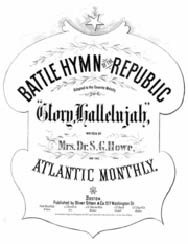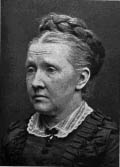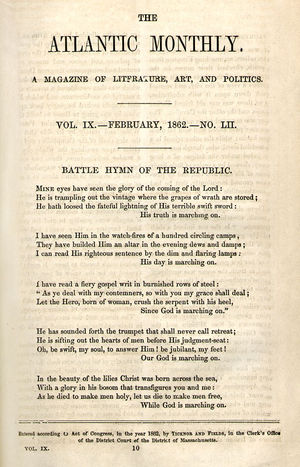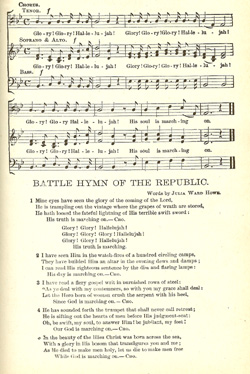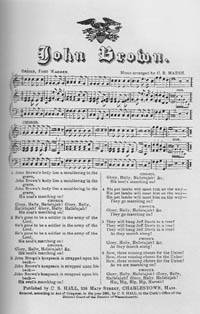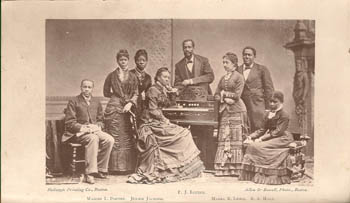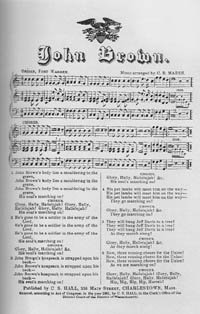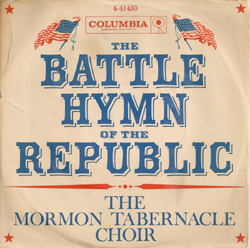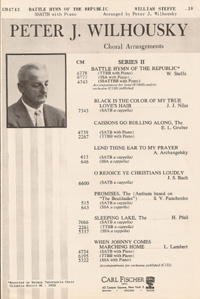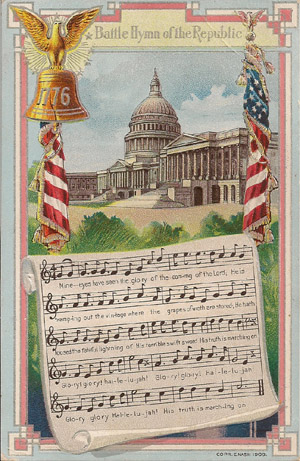
New England Song Series No. 1:
"BATTLE HYMN OF THE REPUBLIC"
Origins of a Civil War song
- The Words: Battle Hymn of the Republic as told by Julia Ward Howe
- The Music: Methodist hymn and the John Brown song
- The Hit Record: Million-seller and Grammy Award winner
- The Lecture: Civil War texts and tunes
- Related Links
The Words
First verse written by Julia Ward Howe:
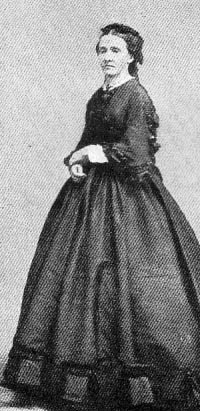
Mine eyes have seen the glory
of the coming of the Lord:
He is trampling out the vintage
where the grapes of wrath are stored;
He hath loosed the fateful lightning
of His terrible swift sword:
His truth is marching on.
"The poem, which was soon published in the Atlantic Monthly, was somewhat praised on its appearance, but the vicissitudes of the war so engrossed public attention that small heed was taken of literary matters. I soon was content to know, that the poem soon found its way to the camps, as I heard from time to time of its being sung in chorus by the soldiers."
--from Reminiscences 1819-1899 by Julia Ward Howe, Boston, Massachusetts, 1899.
Portrait of Julia Ward Howe, about 1865
A more complete account of how she wrote the words for the hymn is reprinted in a document on the multimedia DVD, "Glory, Hallelujah" - Songs and Hymns of the Civil War Era
The first draft of Julia Ward Howe's poem was written in November 18, 1861.
According to James J. Fuld the first printed copy of her poem was in the New York Tribune on January 14, 1862. The following month her poem was published in the Atlantic Monthly magazine, which had a wider circulation. Notice that it was first printed without the familiar "Glory, Hallelujah" chorus, as shown here:
In the book about her mother's noble poem, her daughter wrote the following about it in these excerpts:
""In her Recollections of the Anti-Slavery Struggle she ascribes its composition to two causes -- the religion of humanity and the passion of patriotism. My mother had a long cherished love for her country, but it burned more intensely when the war came, bursting into sudden flame after that memorable day with the soldiers."
"It was published in the Atlantic Monthly for February, 1862. The verses were printed on the first page, being thus given the place of honor. According to custom of that day, no name was signed to them. James T. Fields was then editor of the magazine. My mother consulted him with regard to a name for the poem. The price paid for it was five dollars. But the true price of it was a very different thing, not to be computed in terms of money. It brought its author fame throughout the civilized world, in addition to the love and honor of her countrymen."
-- The Story of the Battle Hymn of the Republic, by Florence Howe Hall, Harper & Brothers, 1916.
The Music
"Battle Hymn of the Republic" has been sung countless times since it was first published in 1862.
The person who is usually credited for composing the tune is William Steffe. But there is no written evidence to prove that he actually wrote the Glory, Halllelujah tune. It is more likely that the tune came from a camp meeting spiritual by an unknown composer. According to John Stauffer and Benjamin Soskis in their book, The Battle Hymn of the Republic: A Biography of the Song That Marches On (2013), there is a version of the original text as early as an 1807 hymnal with these opening words:
O brothers will you meet me,
O brothers will you meet me,
O brothers will you meet me
on Canaan's happy shore?Another later version from the 1850s has slightly different words:
Say brothers will you meet us (repeated twice more)
on Canaan's happy shore?During the 20th century, the Battle Hymn was sung by everyone from the Columbia Mixed Quartet in 1912 to Elvis Presley in the 1970s in Mickey Newbury's "An American Trilogy," and it continues on today. This stirring patriotic hymn has been sung for many solemn occasions, like the worship service at the National Cathedral in Washington, DC after the terrorist attacks of 9/11/2001. It has also been sung at sporting events and show biz events -- on radio, television, and records.
The tune known as "Glory, Halllelujah" was used first for the song, "John Brown" (also know as: "John Brown's Body", first published as a broadside by C.S. Hall in Charleston, Massachusetts in 1861 [ shown below]. This song was written in jest about Sgt. John Brown at Fort Warren in Massachusetts and not the fiery abolitionist, John Brown, who was hung for his raid on Harpers Ferry in 1859. The John Brown song was the one that Julia Ward Howe heard from Union soliders singing and used that tune for her "Battle Hymn of the Republic."
"Glory, Hallelujah" Chorus
The same chorus was used for "John Brown" and "Battle Hymn of the Republic." This chorus must have been well known since it was mentioned on the cover of the first printing. Notice that the title is without "The." It is just -- "Battle Hymn of the Republic." The original sheet music cover is shown here:
BATTLE HYMN OF THE REPUBLIC
Adapted to the favorite Melody "Glory, Hallelujah"
written by Mrs. Dr. S. G. [Julia Ward] Howe
for the ATLANTIC MONTHLY
Boston: Published by Oliver Ditson & Co.,
277 Washington St., 1862
What most writers have missed about this chorus is an important word was added in the original sheet music printing. In the second line of the Chorus there is an additional Glory making it sound even more stirring:
Glory! Glory! Hallelujah!
Glory! Glory! Glory! Hallelujah!
Glory! Glory! Hallelujah!
His truth is marching on.
Read about the amazing performance of "Battle Hymn of the Republic" at the World's Peace Jubilee in Boston in 1872 by the Afro-American group known as The Jubilee Singers on this computer disc --
The First Modern Day performance of the original "John Brown" together with with "Battle Hymn of the Republic," was performed by the Old Stoughton Musical Society Chorus, conducted by Roger Lee Hall. This performance is included on the multimedia computer disc with historical information and music titled,"Glory, Hallelujah!" - Songs and Hymns of the Civil War Era
The Hit Record
(1959)
The Mormon Tabernacle Choir, one of America's most popular choruses, has made numerous recordings of Julia Ward Howe's Civil War hymn, especially the 1944 arrangement by Peter J. Wilhousky, which has become the preferred one for choruses everywhere.
It should be mentioned that in the 1944 arrangement, the last verse ends with the original words by Julia Ward Howe:As He died to make men holy, Let us DIE to make men free.
This was changed in a Mormon Tabernacle Choir recording to:
As He died to make holy, Let us LIVE to make men free.This is perhaps the first time when that line was changed ffrom the original words of "Let us die to make make men free."
Because it was such a hit, the change was adopted by other performers over the years. The lyrics to "Battle Hymn" were printed on the back of the 45 record sleeve, released by Columbia Records in 1959, and this is the last verse:
In the beauty of the lilies Christ was born across the sea,
With a glory in His bosom that transfigures you and me,
As He died to make men holy, Let us LIVE to make men free,
While God is marching on!
According to Joel Whitburn in his authoritative
The Billboard Book of Top 40 Hits, this Mormon Tabernacle record was on the Billboard charts for 11 weeks and reached as high as No. 13.At the 2nd annual Grammy Awards held on November 29, 1959, The Mormon Tabernacle Choir, directed by Richard Condie, received a Grammy
Award for Best Performance By a Vocal Group or Chorus.The Mormon Tabernacle Choir recording was a shortened version of Julia Ward Howe's Civil War song and was suggested to Columbia Records by the popular and influential Cleveland disc jockey, Bill Randle, so the song would fit easily on a 45 RPM record. Randle was the one who had introduced Elvis Presley on national television in 1956.
The Lecture
Would you like to schedule a lecture for your organization about the origins of the texts and tunes for "John Brown's Body" and "Battle Hymn of the Republic" with recorded music examples of both tunes and sheet music on display?
For more details about this lecture, click this link:
Related Links
"Glory, Hallelujah!" - Songs and Hymns of the Civil War Era
"John Brown (John Brown's Body)"
"Lincoln and Liberty" - Music From Abraham Lincoln's Era
New England Song Series No. 2: GOIN' HOME
New England Song Series No. 3: JINGLE BELLS
New England Song Series No. 4: SIMPLE GIFTS
New England Song Series No. 5: SONG OF THE OLD FOLKS
New England Song Series No. 6:
FATHER AND I WENT DOWN TO CAMP (Yankee Doodle)Singing Stoughton - one of America's oldest music traditions
Please help support the mission of the
Center for American Music Preservation (CAMP)
Order music titles from the
© 2012. PineTree Productions. All Rights Reserved for original material on this site.




